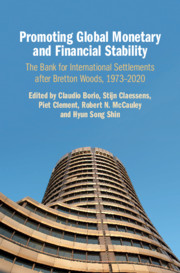48 results
4 - Institutionalizing Central Bank Cooperation
- from Part I - General
-
-
- Book:
- The Spread of the Modern Central Bank and Global Cooperation
- Published online:
- 02 November 2023
- Print publication:
- 16 November 2023, pp 80-102
-
- Chapter
- Export citation
W. F. P. Burton (1886–1971). A Pentecostal pioneer's missional vision for Congo. By David Emmett. (Global Pentecostal and Charismatic Studies, 39.) Pp. xxiv + 330 incl. 28 colour and black-and-white ills. Leiden–Boston: Brill, 2021. €59 (paper). 978 90 04 42682 5; 1876 2247
-
- Journal:
- The Journal of Ecclesiastical History / Volume 73 / Issue 3 / July 2022
- Published online by Cambridge University Press:
- 15 July 2022, pp. 681-683
- Print publication:
- July 2022
-
- Article
- Export citation
Graphs and Tables
-
- Book:
- Promoting Global Monetary and Financial Stability
- Published online:
- 10 April 2020
- Print publication:
- 30 April 2020, pp viii-viii
-
- Chapter
- Export citation
Annex 2 - BIS-Based Committees – Membership, Chairs and Secretaries, 1962–2020
-
- Book:
- Promoting Global Monetary and Financial Stability
- Published online:
- 10 April 2020
- Print publication:
- 30 April 2020, pp 221-229
-
- Chapter
- Export citation
Contributors
-
- Book:
- Promoting Global Monetary and Financial Stability
- Published online:
- 10 April 2020
- Print publication:
- 30 April 2020, pp ix-xii
-
- Chapter
- Export citation
Annex 3 - BIS Balance Sheet, 1980–2019
-
- Book:
- Promoting Global Monetary and Financial Stability
- Published online:
- 10 April 2020
- Print publication:
- 30 April 2020, pp 230-233
-
- Chapter
- Export citation
Bibliography
-
- Book:
- Promoting Global Monetary and Financial Stability
- Published online:
- 10 April 2020
- Print publication:
- 30 April 2020, pp 241-252
-
- Chapter
- Export citation
Annex 5 - Shareholding Members of the BIS as on 1 July 2020
-
- Book:
- Promoting Global Monetary and Financial Stability
- Published online:
- 10 April 2020
- Print publication:
- 30 April 2020, pp 237-239
-
- Chapter
- Export citation
Contents
-
- Book:
- Promoting Global Monetary and Financial Stability
- Published online:
- 10 April 2020
- Print publication:
- 30 April 2020, pp v-vii
-
- Chapter
- Export citation
Acknowledgements
-
- Book:
- Promoting Global Monetary and Financial Stability
- Published online:
- 10 April 2020
- Print publication:
- 30 April 2020, pp xvi-xvi
-
- Chapter
- Export citation
Annex 4 - Current and Former Functionaries of the BIS Board of Directors and BIS Management, 1973–2020
-
- Book:
- Promoting Global Monetary and Financial Stability
- Published online:
- 10 April 2020
- Print publication:
- 30 April 2020, pp 234-236
-
- Chapter
- Export citation
Note on Sources
-
- Book:
- Promoting Global Monetary and Financial Stability
- Published online:
- 10 April 2020
- Print publication:
- 30 April 2020, pp 240-240
-
- Chapter
- Export citation
Abbreviations
-
- Book:
- Promoting Global Monetary and Financial Stability
- Published online:
- 10 April 2020
- Print publication:
- 30 April 2020, pp xvii-xviii
-
- Chapter
- Export citation
Annex 1 - BIS Chronology
-
- Book:
- Promoting Global Monetary and Financial Stability
- Published online:
- 10 April 2020
- Print publication:
- 30 April 2020, pp 214-220
-
- Chapter
- Export citation
The BIS in Pictures, 1973–2020
-
- Book:
- Promoting Global Monetary and Financial Stability
- Published online:
- 10 April 2020
- Print publication:
- 30 April 2020, pp 94-111
-
- Chapter
- Export citation
Index
-
- Book:
- Promoting Global Monetary and Financial Stability
- Published online:
- 10 April 2020
- Print publication:
- 30 April 2020, pp 253-265
-
- Chapter
- Export citation
Introduction
-
-
- Book:
- Promoting Global Monetary and Financial Stability
- Published online:
- 10 April 2020
- Print publication:
- 30 April 2020, pp 1-10
-
- Chapter
- Export citation
Appendices
-
- Book:
- Promoting Global Monetary and Financial Stability
- Published online:
- 10 April 2020
- Print publication:
- 30 April 2020, pp 214-239
-
- Chapter
- Export citation
Copyright page
-
- Book:
- Promoting Global Monetary and Financial Stability
- Published online:
- 10 April 2020
- Print publication:
- 30 April 2020, pp iv-iv
-
- Chapter
- Export citation

Promoting Global Monetary and Financial Stability
- The Bank for International Settlements after Bretton Woods, 1973–2020
-
- Published online:
- 10 April 2020
- Print publication:
- 30 April 2020



